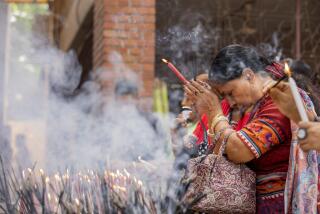Bangladesh’s Lurking Terror
- Share via
It has been just two months since my father was killed in an act of political terrorism. He had traveled from Dhaka, the capital of Bangladesh, to address a public meeting in the northeastern part of the country on Jan. 27. Hundreds of people had gathered to hear him speak. As he left the auditorium, without any police protection, a series of grenades exploded.
My father was badly hurt, but despite the frantic requests of my mother and many of his colleagues in the hours after the attack, the government did not provide him with helicopter transport to medical facilities in Dhaka. His ambulance ran out of gas as it raced toward a hospital, and he bled to death. Four other opposition party members also died in the attack.
My father’s name was Shah A.M.S. Kibria and he was a renowned public figure in Bangladesh; he had served as finance minister and foreign secretary, as well as undersecretary-general of the United Nations. At the time of his death, his party was out of power, and he was serving as a member of the opposition in Parliament and as a newspaper columnist. In recent years, he had become a highly vocal critic of the sharp rise of militant Islamist extremism and state-sponsored political violence in Bangladesh.
Though it’s gotten very little attention in the United States, his assassination has plunged Bangladesh into a political crisis reminiscent of what happened in Lebanon in the wake of the assassination of the former Prime Minister Rafik Hariri. In Bangladesh, as in Lebanon, people from all walks of life have taken to the streets to express their outrage at the brutal killing and their conviction that the government is implicated in it. Our family, like Hariri’s family, is demanding an international investigation. But unlike Lebanon, the Bangladesh government -- an alliance of the Bangladesh Nationalist Party and the fundamentalist Jamaat-i-Islami -- has shown no interest in cooperating.
What prevails today in Bangladesh is a climate of impunity for terrorists, fostered by the apathy of the government and its repeated claims that there is no terrorism problem. And so those who wish to hurl grenades at members of the opposition or to bomb secular cultural events or to club to death progressive writers and intellectuals may do so without fear of prosecution. Music festivals, movie theaters and even a Valentine’s Day reception have all been the scenes of recent attacks.
Political violence has skyrocketed. Government security forces are engaged in politically motivated and extrajudicial killings, according to a recent U.S. State Department report. In its efforts to suppress dissent, the BNP/Jamaat-i-Islami government has engaged in mass arrests of opposition party members prior to their planned public rallies. Harassment of religious minorities has sadly become an expected matter.
An especially alarming development in Bangladesh is the growth of the “Bangladeshi Taliban” -- a collection of local militant Islamist groups with reported links to international terrorist organizations. This includes the Jagrata Muslim Janata Bangladesh, which has imposed its own Taliban-like rule in parts of northwestern Bangladesh. It was only last month, after considerable international pressure, that the government declared its intent to arrest the JMJB’s leader, the infamous “Bangla Bhai,” thus reversing its prior position of allowing the JMJB to operate undisturbed, even denying its very existence.
Even as the U.S. has expanded its war on terrorism across more and more of the world, Bangladesh has escaped attention. In many ways this is not surprising. Bangladesh has never, since its bloody and triumphant birth in 1971, been seen by the U.S. to be a country of much strategic importance. In the calculations of those who make foreign policy, Bangladesh is greatly overshadowed in significance by its feuding nuclear-power neighbors, Pakistan and India.
But in the long term, the price of inaction could be high. Is it prudent to ignore a political crisis in a country of 141 million people, home to the fourth-largest concentration of Muslims in the world? Are we better off dealing immediately with a problem that can most likely be solved through firm international diplomacy or waiting for a later time when we may be contending with a rogue state that lends aid and comfort to Islamist extremists?
The situation in Bangladesh is not irreversible. There is a strong and well-rooted tradition of democracy and secular government in Bangladesh. Indeed, my father was a representative of that tradition. His assassination has galvanized supporters of these ideals to stand together against those who would make Bangladesh a place of terror, intolerance and repression.
Nothing will bring back my father or end for me the painful knowledge of the brutal and senseless way in which he was killed. But I hope his assassination will mark a new beginning for Bangladesh, one in which the country moves away from terror and toward the vision of democracy, justice and tolerance that my father held so dear.
More to Read
Sign up for Essential California
The most important California stories and recommendations in your inbox every morning.
You may occasionally receive promotional content from the Los Angeles Times.










